#levi meta
Explore tagged Tumblr posts
Note
Hello! Is there any official arts where Levi is drinking? Does Levi even drink alchocol?.. Please, would you help me to clear that fact?
Thank you!!
There are indeed! This is one of my all time favourite pieces of official Eruri art. It's from the old 3DS game, and the text that went with it as translated by @oscarforjm.

The New Joiner Welcoming Party
The time is before the 57th expedition. Erwin is hosting a welcoming party for the new Survey Squad joiners (i.e. 104th). Erwin does not join the party and sits somewhere away from the crowds drinking alone because he thinks the kids cannot really relax if he is also in the party. Levi finds him.
Erwin “In order to save human race, I will have to send these new kids to death”
Levi “To me, as long as titans are being killed, it’s fine. You know about it right?” (Note: Levi is trying to comfort Erwin saying that Erwin is not doing something evil and he wants to re-confirm Erwin that he will never deny Erwin’s choice :)
Erwin “Yes……………I totally rely on you, Levi”
Levi “Huh……………..are you drunk?”
Erwin “……………………..may be I am”
You can also see Levi drinking in the manga in chapter 72 and again in a flashback to the same night in chapter 130.


Levi also appears to be drinking some kind of alcohol in this visual for the official Shingeki FLY Afterparty event.


In terms of Levi's alcohol tolerance, there was an article in Kodansha's FRaU magazine back in 2014, which included an interview and Q&A with Isayama. @fuku-shuu posted a partial translation from the Chinese:
Q: Captain Levi loves his tea, but does he drink alcohol? What about other characters like Hanji, Moblit, Erwin on the veterans’ side? Who has the highest tolerance? A: Levi can handle his drink, but the unfortunate Moblit drinks the most.
Before leaving this topic, I'm also going to include this one just for funsies. Please enjoy Levi getting hammered with Rascal the Raccoon.

96 notes
·
View notes
Note
Hi, Kat! ❤️ I just want your opinion!
I read a priest Levi fanfic and I want to know…do you think Levi would be religious? AU, Canon, or both.
I don’t want to sound controversial, this is just for funsies❤️ although, I think I now have a religious Levi fanfic idea in my head 🤔
Thanks Pookie❤️
hi!! how are you doing?
Hmm, I'm not sure! I personally am an atheist so headcanoning anything related to religion isn't something that usually crosses my mind 🤔 I will note that I do not have a very good relationship with religion in general, so please take what I say with a grain of salt 😭
I think if it's canonverse, he might not be, but only because the main form of religion we see are the Wallists, and as we were able to see, he was more annoyed than anything else by the argument between Nick and Dimo during the tribunal in season 1 regarding what they should be doing with the Wall/gates. If he was religious, I'd probably say he partakes mildly in the practice, as more of a thing to keep him going when times are hard, but I think his main drive is much more wanting to prove that the death of his comrades meant something
If it's a modern!au, then perhaps! I can't really think of anything to argue against it! I'm also not really sure with how religious identity develops, so I'm not the most well-versed in what would indicate if he would be religious or not 🤔 But you know my take on headcanons being whatever you wanna make them to be ☺️
SO YOU WRITE THAT RELIGIOUS LEVI FIC AND TAG ME IN IT WHEN YOU DO 🔪
12 notes
·
View notes
Text
The process by which Invincible has had to condense and consolidate the plot beats of the original comic, coupled with the opportunity it's granted the writers to tighten up and emphasize its themes on a second pass, has resulted in a newfound appreciation for how unbelievably fucking good Angstrom Levy's whole character concept is. What's that, Mark? Your main emotional crisis this season is your fear of turning out like your father? Here, have an archnemesis who's out to kill you because his memories were inadvertently overwritten with the lived experiences of hundreds of alternate versions of himself whose friends and families were slaughtered in worlds where you did, in fact, turn out exactly like your father. Because it turns out that that is in fact the multiversal norm. That you turn out like your father. And now you're left to wonder what set of arbitrary coinflips pulled you back from that abyss in this dimension, and whether your luck is going to continue to hold into the future.
#invincible#invincible amazon#thoughts#meta#angstrom levy#Mark Grayson#this is present in the text of the comic but much better articulated in the show
3K notes
·
View notes
Text
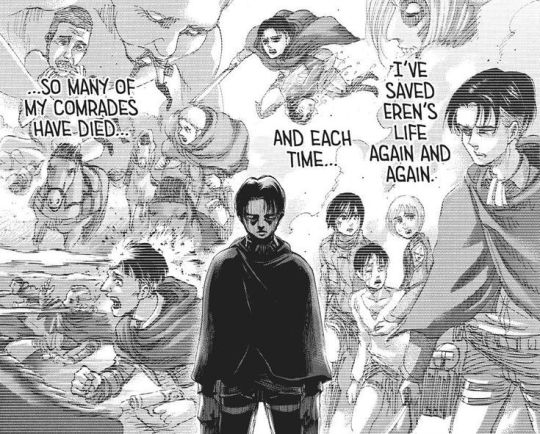
Levi and his selfless nature deserves more, he cares, and he cares so much. The biggest mischaractertion of Levi is that he doesn't care about his comrades or that he only cares for one character, which is far from the truth and disrespectful to his actual character. He lost so many friends/comrades, and the gulit he probably feels for surviving is huge. Levi remembers all of them, he carries a burden and promises to avange them, to prove that their sacrifice had meaning.
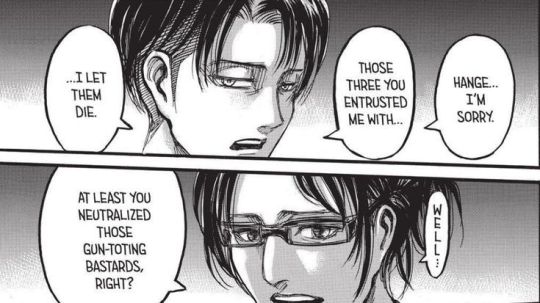
One panel that I love is this one where he apologizes to Hange because he feels like their deaths were his fault, that he failed, and he couldn't save them. Levi felt like he let Hange down despite the situation not being his fault, and Hange wasn't mad at him at all, they understood that if he could've saved them, he would've.
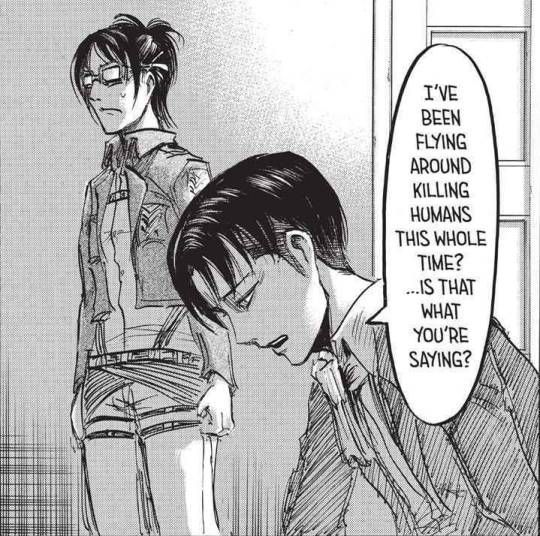
This one hits on a different level, his empathy really comes through here. He feels gulity once more, realizing that the titans he has been killing were human all this time, I think this took a huge toll on him. Levi doesn't enjoy killing, he is a skilled soldier, that doesn't mean that he takes pleasure in it, it's his job and in his life he had to kill or he would be killed, he has no other choice. Levi values all life the same and to see him get reduced to someone who is selfish and cold, isn't fair to him.
#aot#aot levi ackerman#attack on titan#levi#levi ackerman#shingeki no kyojin#aot levi#levi aot#snk#aot manga#aot meta
712 notes
·
View notes
Text
LEVI ACKERMAN: WHY HE IS HUMANITY'S STRONGEST SOLDIER
This post contains:
An in depth analysis on Levi's motivations and what underscores them
His view on his strength
Why Levi is so reserved
Why Levi was obsessed with killing zeke



Levi presents a nuanced exploration of the gap between initial impressions and underlying motivations.
While his initial demeanor appears stoic and potentially aloof, bordering on arrogance, a closer look can reveal a profound sense of responsibility and dedication driving his actions.
Levi's act of comforting a dying comrade while vowing to eradicate the Titan threat signifies a deeply ingrained sense of purpose.

This act transcends mere pragmatism, demonstrating an emotional connection to the fallen and a commitment to the collective cause of the Survey Corps.
His vow is a promise to honor the sacrifices made by countless individuals, carrying their collective resolve forward in the fight for a Titan-free world.
He is burdened by the weight of loss yet driven by an unwavering commitment to the ideals and the fallen comrades of the Survey Corps. He embodies the collective hope of humanity, particularly those who dedicate their lives to the eradication of the Titan threat, ensuring that the sacrifices made will not be in vain.
His physical prowess is a defining aspect of his character and role within the narrative.
His strength serves as a pillar of support for those around him. His ability to consistently survive and excel in battle, as evidenced by his reassurance to the dying comrade, instills a sense of hope and security in his comrades. He becomes a symbol of unwavering resilience amidst the constant threat of annihilation.
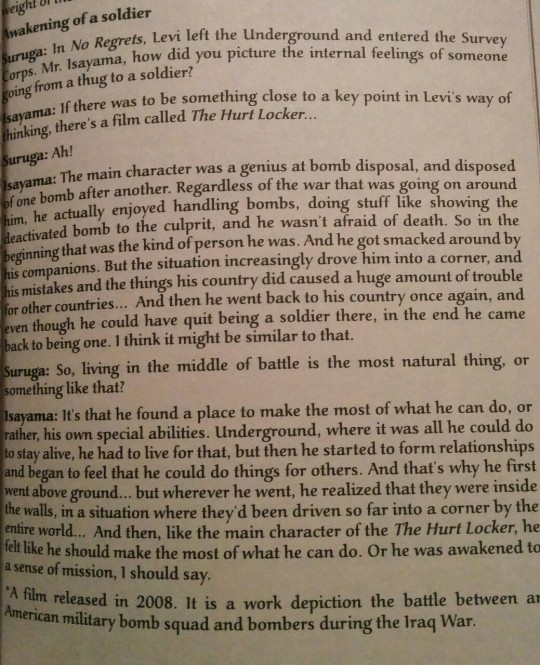
However, Levi's perception of his strength extends beyond its immediate utility. He views it as a burden, a responsibility inextricably linked to his title as "Humanity's Strongest Soldier."
He recognizes that his superior abilities often come at the cost of countless lives lost around him, leaving him as the sole survivor in dire situations. This realization fosters a profound sense of duty within him.
Levi's strength compels him to carry the memory and legacy of the fallen. He acknowledges that his survival necessitates fulfilling their unfulfilled aspirations and carrying forward the collective resolve of the Survey Corps.
This is exemplified in his willingness to take responsibility for Eren, even to the point of eliminating him if necessary, and in Erwin's unwavering trust in Levi to handle crucial tasks, such as subduing Beast Titan.
While Levi's immense strength grants him immense power, it is not a source of pride or personal gain.
As Kenny said, Levi is a slave to being a "hero".
He feels an immense responsibility to utilize his power for the greater good, becoming a protector and champion for humanity in their desperate struggle against the Titan threat. This unwavering commitment manifests in various ways, from advocating for the desperate measures of feeding civilians to his relentless dedication in the fight against Titans.
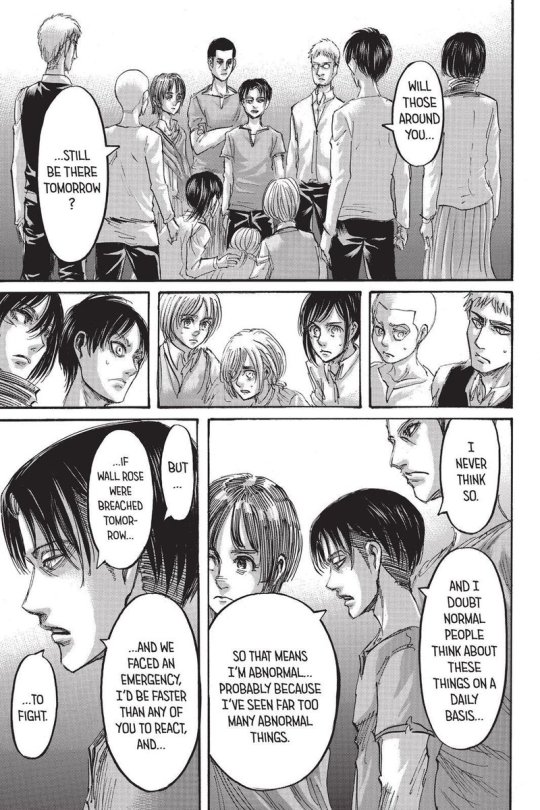
Levi's reserved demeanor is a consequence of a life marked by constant anticipation of tragedy and the loss of countless comrades.
His atypical upbringing, from the harsh realities of the underground to the brutal world of the Survey Corps, has instilled a deep-seated expectation of further losses.
This environment makes emotional expression difficult, leading him to adopt a detached exterior as a coping mechanism.
However, Levi's emotional self-preservation doesn't diminish the profound care he harbors for human life. He fights relentlessly for the sake of strangers, suffers immense anguish with each squad he loses, and his empathy for suffering stems from his own deprived childhood, where basic necessities like sunlight and food were scarce.
Throughout the manga, Levi endures a relentless cycle of loss, constantly grappling with the responsibility of being the "last man standing."
He carries the weight of their sacrifices, driven by the unwavering determination to fulfill their shared dream and ensure their deaths were not in vain. This ever-growing burden continues to shape his reserved nature and fuels his unwavering dedication to the fight for humanity's survival.
Levi's unwavering dedication extends beyond his own burdens. He readily takes on the emotional weight of others, particularly evident in his interaction with Erwin.
When Erwin confesses his guilt and internal turmoil regarding the lives sacrificed in the charge, Levi deliberately chooses to shoulder that burden himself.
This act transcends mere support; it is a conscious decision to relieve Erwin of the immense pressure associated with the lives lost.
Levi explicitly states, "I am making the choice," signifying his deliberate assumption of the responsibility.
This choice carries immense consequences. Levi takes on the horror of the charge and the weight of all the lives lost – the recruits who perished and ultimately, Erwin himself.
This decision contributes significantly to the profound weight that burdens him throughout the manga.
It manifests in his overwhelming sense of failure when he ultimately cannot eliminate Beast Titan, and his heartfelt apology to the charging recruits further underscores the gravity of the responsibility he carries.
As the manga progresses, the weight on Levi's shoulders intensifies. Eren, the boy he once vowed to protect and take responsibility for, ultimately betrays humanity, leaving Levi questioning the "awful joke" of the sacrifices made throughout their journey.
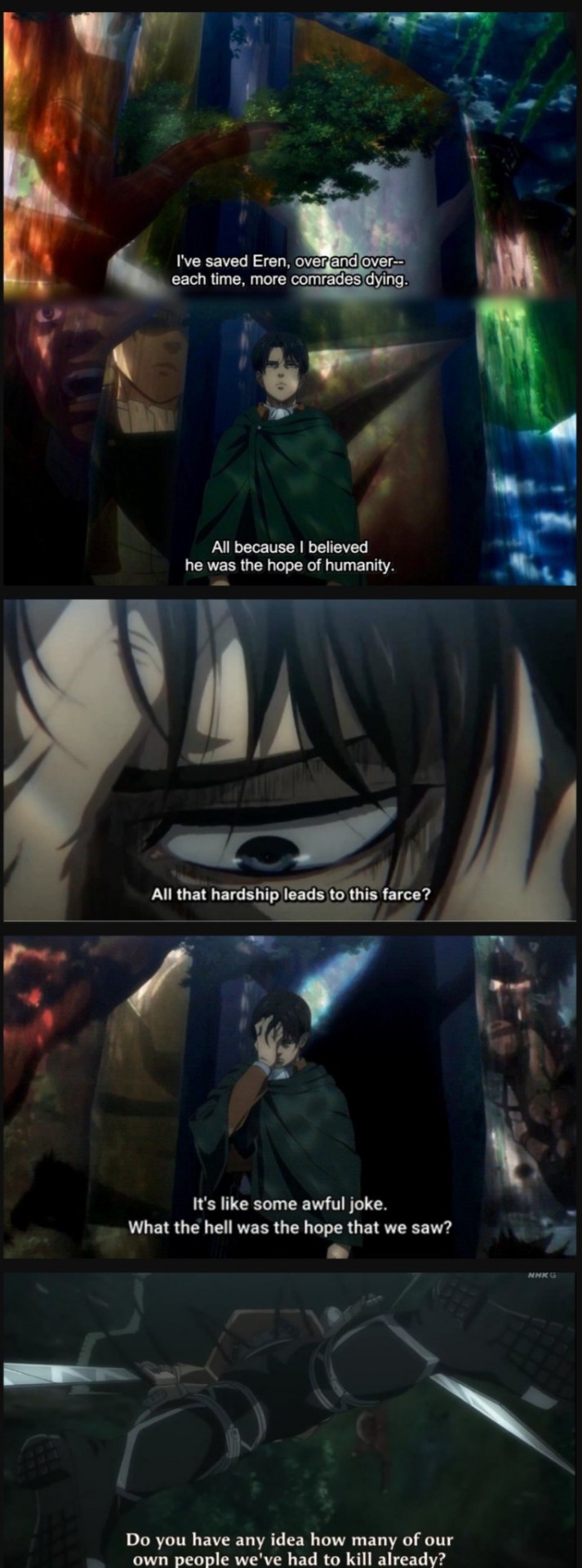
The lives he feels deeply responsible for, even going so far as stating to Zeke that he views them as "killed" by their actions, become a constant source of internal conflict and fuel his unwavering determination to continue the fight for humanity's survival.
As Levi enters the final battle, the physical and emotional toll he bears surpasses anything he has faced before.
He loses the last remaining comrade from his friend group (Hange), faces the seemingly impossible task of fighting his former subordinate, and suffers critical injuries, losing an eye and fingers just days prior.
Despite his weakened state, his sense of responsibility intensifies. He refuses to rest even when Armin urges him to, driven by an internal pressure that compels him to fight.
No external force compels him to engage in this final battle; it is solely driven by his overwhelming sense of responsibility.
His determination to protect his remaining comrades manifests in his actions – offering himself as bait for Mikasa, saving Jean, and enduring further injury while saving Connie.
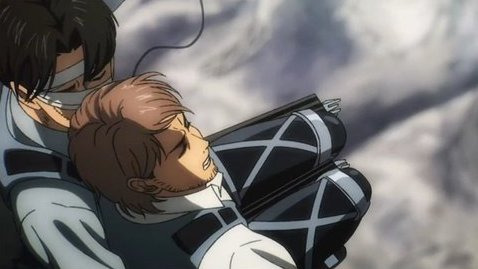
Even while coughing up blood, he maintains a facade of strength, burdened by the weight of being humanity's strongest.
Finally, after temporarily being sidelined due to his injuries sustained while saving Connie, the immense pressure he has been carrying throughout the narrative culminates in a moment of vulnerability.
Levi is forced to confront the "awful joke" of their situation once again. Now physically broken, Levi contemplates his inability to contribute further, succumbing to self recrimination in the face of immense loss, horror, and guilt.
He questions the purpose of their struggle, wondering if it was all in vain.

However, amidst this profound despair, Levi exhibits a remarkable resilience. He reaffirms the idealistic dream that the Survey Corps fought for, recognizing the inherent value of the lives lost and refusing to succumb to regret.
He chooses to look forward, believing in a better future and the potential of the next generation of idealists. Even in the darkest moment, physically unable to walk and coughing up blood, Levi remains the voice of reason, urging Mikasa to pull it together as they are the "only ones left who can kill Eren."
This unwavering commitment to his duty proves the fact that Levi never stopped fighting, even when his own body betrayed him.
Despite being presumed out of the fight, Levi's unwavering spirit compels him to push through his debilitating injuries and excruciating pain.
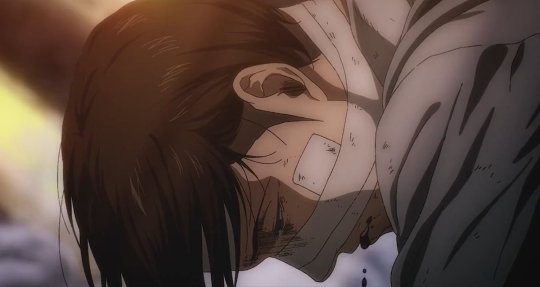
This final act of defiance proves crucial in both halting the Rumbling and saving countless lives, fulfilling the promises he made to his fallen comrades and granting meaning to their ultimate sacrifice.
In the aftermath, a profound shift occurs within Levi. He acknowledges the immense contributions of his comrades, recognizing that their unwavering dedication fueled his own actions.
The immense pressure and the burden of countless lives he carried finally lifts, allowing him to release the pain he had bottled up for so long.
For the first time, after enduring countless tragedies, we witness Levi shed tears, signifying a release of the emotional weight that had burdened him throughout his arduous journey.
Levi's title as "Humanity's Strongest Soldier" extends far beyond his physical prowess.
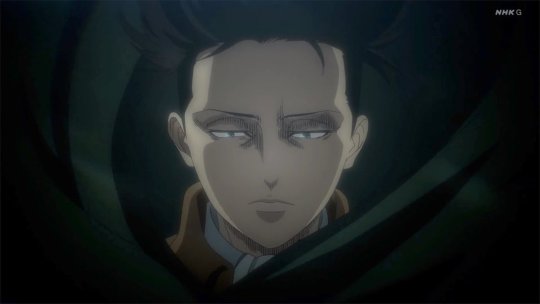
It is his unwavering mental fortitude, forged from constant struggle, that truly defines him. He chooses not to succumb to bitterness or resentment, even after facing a lifetime of hardship and loss. Instead, he exhibits an extraordinary resilience, fueled by an unwavering determination to protect humanity.
Many characters within the narrative succumb to the cycle of violence and hatred. They wield their power to inflict pain and dominate others, fueled by the trauma they have endured. Others, like Ymir, become paralyzed by their past, unable to utilize their abilities to help others. Still others, like Zeke, lose hope in the possibility of a better future.
Levi's journey stands as a powerful counterpoint to these destructive tendencies. He demonstrates that even individuals who have suffered immensely, who have every reason to be disillusioned and apathetic, can choose to believe and fight for the betterment of others. He views his exceptional strength not as a privilege but as a profound responsibility, a tool to be wielded for the benefit of humanity and the preservation of individual lives.
Even as the world around him crumbles, Levi continues to exhibit compassion and a desire to contribute positively. He chooses to break the cycle of hate and despair, actively seeking to put more good into a world that inflicted immense pain upon him. This unwavering commitment to hope and the value of human life stands as a testament to the enduring strength of the human spirit, even in the face of unimaginable adversity.
Other analyses by me:
Levi and Kenny
How Levi utilizes his intellect in fighting and decision making and his leadership in final battle
Levi Ackerman (an overall analysis? One of my first one so it's not that good ig)
The Yeagers and the Ackermans I: Their motivations and dynamic
The Yeagers and the Ackermans II: The Similarities and the Contrasts
#anime#levi ackerman#manga#shingeki no kyojin#attack on titan#animanga#anime and manga#snk levi#levi aot#character analysis#analysis#cielettosa meta#cielettosa
714 notes
·
View notes
Text
Something I find fascinating is how Isayama sharply contrasts Levi's cleanliness to the "filth" in the underground, from filth I mean the worst that humanity had to offer, being surrounded with murders and people who commit heinous crimes but Levi being so dedicated to cleanliness could also mean him being as compassionate, selfless and kind he is, in a place where such traits are rare.
How underground is a place of total deprivation not even sunlight reaches there, how easy it is to lose any sort of hope in the world where there is no light but Levi still holds light within by simply being the compassionate man he is and finding great value in life. Levi didn't even have anyone good to look up to (except his mother who died quite early) and the first thing he was taught was violence but how Levi was able to still be a morally upstanding man.
For this simple fact alone, I truly admire and respect Levi, it takes so much strength to be able to do that. Really Levi ackerman is the best character on aot and noone can tell me otherwise.
#levi ackerman the man that you are#aot meta#levi ackerman#levi#attack on titan#aot#snk#shingkei no kyojin#levi aot#levi ackerman aot#levi snk#captain levi#levi appreciation post#i hope it makes sense
227 notes
·
View notes
Text
Hange and Levi's first meeting in No Regrets and what it means to Levi
I'd like to talk about a scene in No Regrets that gets brought up sometimes by certain people in the fandom, which is Levi and Hange's first meeting, but I don't think fandom talks enough about the emotional impact this scene must've had on Levi, or why that first meeting is so important to him. This scene always manages to make me feel emotional no matter how many times I think about it, hence why it's my favourite part of the manga, because for the first time since Levi, Furlan and Isabel got in the Survey Corps, someone treated them with kindness and didn't look down on them.
The first thing we can notice from the way Hange approached them is how genuine and excited Hange is with what they achieved with the Titan, making sure to include them all in the achievement and not only Levi as seen here by how Isabel tells Hange that their group is amazing and Hange agreeing with her.
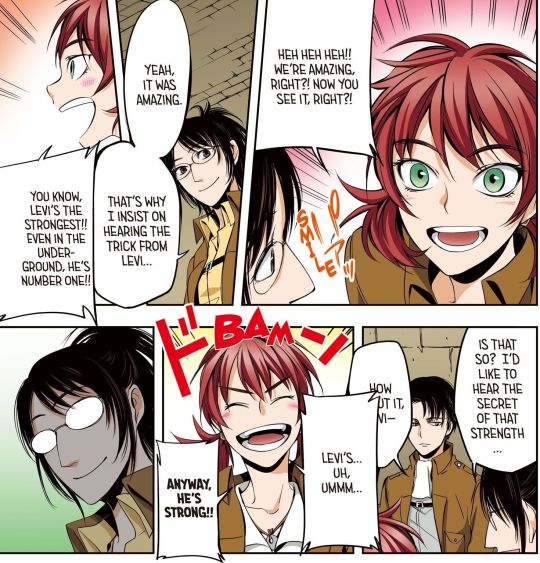
Hange is interested in getting to know more about Levi's strength, but it's in a way where they want to learn from him and get taught by him rather than in an idea of using his strength as a tool. By bringing the other Scouts in the conversation as seen below, Hange encourages Levi to teach them his tricks so they can all have better chances of survival and also kill Titans more efficiently from now on.
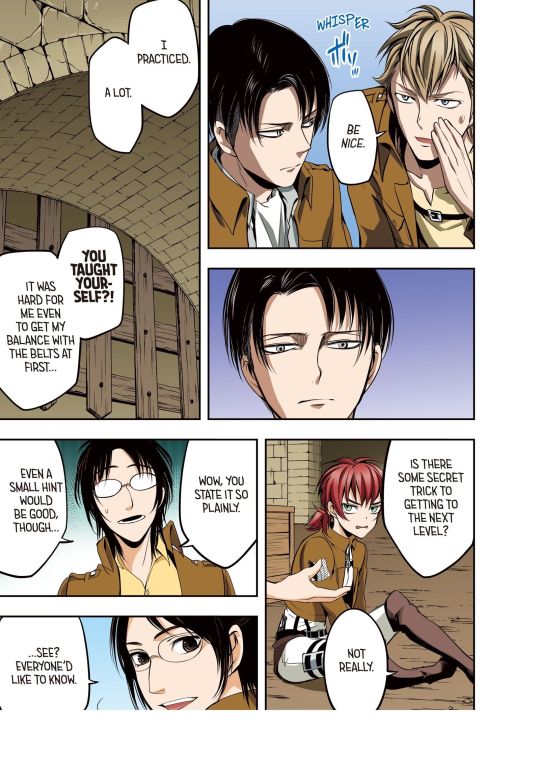
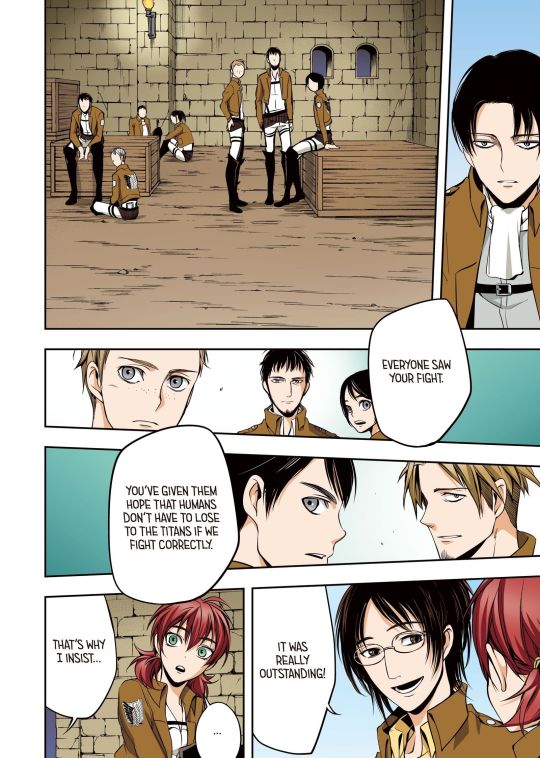
Hange wants to get to know Levi as a person first and foremost, which does impact Levi who hasn't really met anyone in the Survey Corps until that point to be interested in himself as a person and not just as a tool, and in his friends too as he's inseparable from them. Hange doesn't forget about them and even includes them in the conversation in their own easygoing way as seen in this panel.
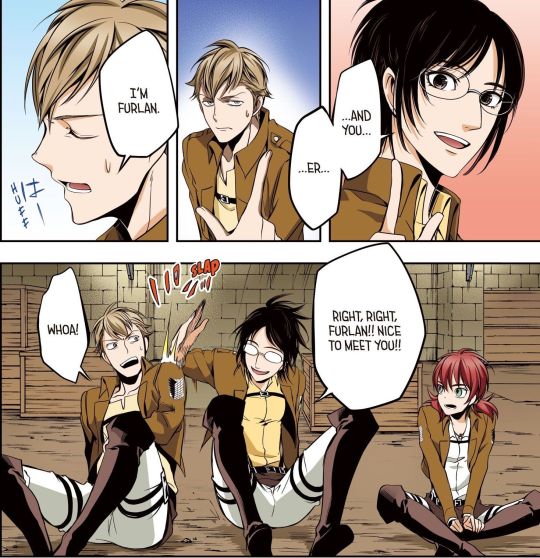
Continuing on this idea, one of the most important parts of this scene is how Hange isn't only friendly with Levi, but they're friendly with Isabel and Furlan too, going so far as to give Isabel a treat for the start of their new friendship. It might not mean much, but for people who recently left the Underground where getting treats was probably a luxury or at best hard to come by, Hange's action will impact them far more than some people might realize. These three have constantly been called thugs or have been disrespected until they showed their technical prowess with Titans during their first expedition, so to see Hange push past that barrier by wanting a genuine friendship with them is such a contrast to the way they have been treated by the others all this time. And even when Levi is curt with Hange, they don't give up, inviting them all to a meal after the expedition is over, which shows how much Hange wants to get to know them better as people, and not only as soldiers skilled with ODM gear.
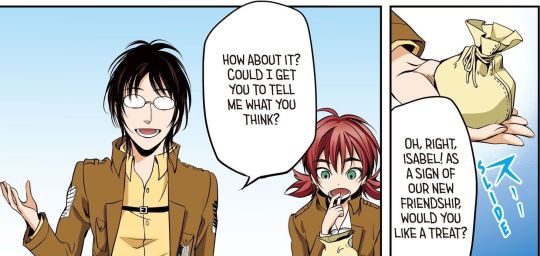
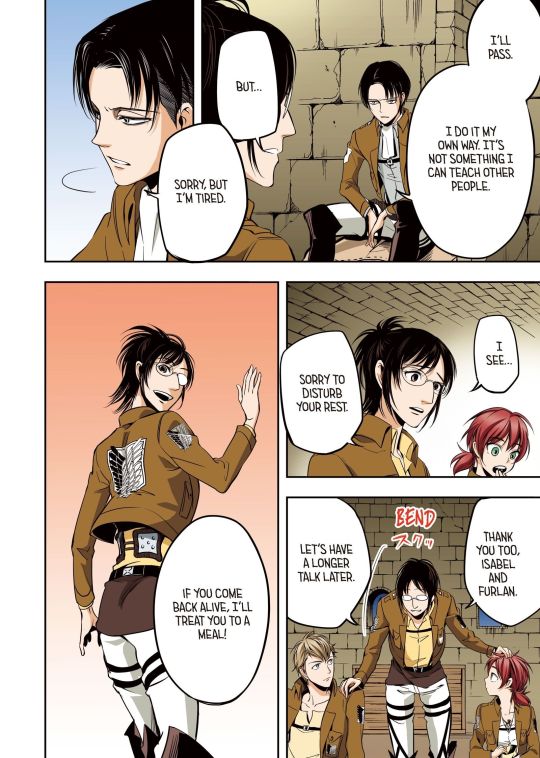
I think what impacted Levi the most out of that exchange wasn't necessarily that Hange was kind with him. It's definitely important, but when we know how much Levi cares about the ones he loves, how he values their lives much more than his own, it's that Hange was so kind with his friends that really impacted him the most, and I don't think fandom talks enough about it. How affected Levi must've been by Hange's sheer kindness without expecting anything in return from him in a world where that concept simply didn't exist. Levi was being kind with others, but this is the first time we see someone else that isn't part of his group be kind to him in return. I think what Hange did that day for him and his friends meant a lot more to Levi than we realize. Someone in the Survey Corps finally treated them as they should've always been treated, with respect and kindness and not with disdain or even coercion. And Hange isn't bothered by his refusal to communicate with them as seen by Furlan's reply here: "Anyway, Hange doesn't seem particularly bothered."
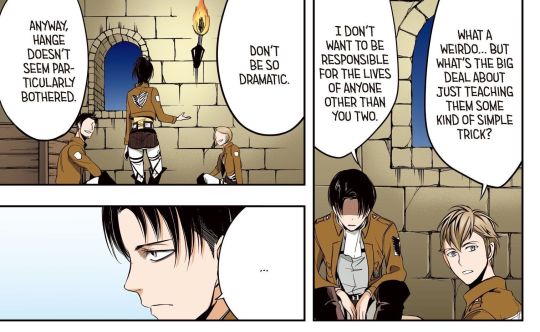
They respect his boundaries when Levi doesn't feel like answering since he doesn't want to get attached to new people (we know how that plan failed in retrospect, but he still tried), and that's because Hange doesn't try to force anything out of him. They tried and he didn't want to engage, that was fine with them, they'll still want to be his friend in the future regardless of Levi's answer. And I don't think fandom gives enough credit to Hange in this scene.
This scene will forever remain my favourite in No Regrets because it shows just how incredibly kind and friendly Hange was with Levi since the very beginning. Yes, this has to do with Hange's personality, that it's just like them to be attracted by the new outsiders or misfits and try to befriend them, but the important part is that someone at least tried. And it makes total sense how out of everyone we know, it had to be Hange to carry out that role. Someone caring as much about his friends as Levi simply cannot be hated by him. This scene actually destroys that claim even more, because by this definition, Levi would have to hate the first person in the Survey Corps to actually be friendly with his friends, the most important people in his life at that moment in time. It's again completely nonsensical to say that, and I do think the people who keep saying it either have forgotten this scene exists or they'd rather ignore it because it wasn't included in the OVA. But regardless of the reason, the fact remains this scene is part of the No Regrets manga and is important to delve even further into the relationship of Levi and Hange as it presents the blueprint of their relationship. Supportive and caring for each other until the very end.
Edit: I want to add that Levi definitely felt suspicious towards Hange's kindness at first since genuine kindness doesn't exist in his world. Coming from the Underground, he has all the reasons to be suspicious of Hange (as people have pointed it out in the reblogs). That being said, Hange's intention was to be friendly with him without wanting anything in return from that friendship, and I do think Levi was more appreciative of the whole exchange later in time when he got to learn Hange better. I struggle to say that someone who later in the story becomes one of his closest friends tried to be manipulative with him at the beginning of their relationship like the man with glasses from Bad Boy. Levi would never try to befriend such a person in my opinion. But we all know how their relationship grew instead, where their communication skills are beyond anything we've seen in the manga, so in the end, Hange's intention of becoming his friend proved to be genuine despite Levi's first suspicions. Therefore, I respectfully disagree with the interpretation brought forward in the comments that Hange might've been manipulative with Levi and his friends. Hange has no reason to manipulate them. Let's all remember Hange has no clue whatsoever about the subject Levi, Furlan and Isabel discuss beforehand. They're only interested in the group's prowess and efficiency at fighting Titans, and then later in them as people since they're open to a more meaningful friendship with them three. Someone manipulative wouldn't have cared about being friends with them afterwards.
#attack on titan#levi ackerman#hange zoe#isabel magnolia#furlan church#aot meta#snk meta#levihan#aot#snk
77 notes
·
View notes
Text
Levi's Intelligence
Levi's intelligence is often overlooked, probably because he's compared directly to Erwin and Hange. Erwin and Hange are both extraordinarily intelligent, but Levi is immensely intelligent himself. He is able to read people (better than any other character), and he knows how to make the best use of what he has available. Many other users have done a wonderful job expanding on Levi's emotional intelligence, so I wanted to expand on some of his feats of general intelligence:
I. Ability to Both Think Long-Term and Make Quick Decisions While in the Midst of Battle
After Historia and Eren are captured by Kenny and the MPs, Levi avoids immediately chasing after them—similarly to how he approached the situation with the Female Titan. The overall strategic goal still remained keeping Historia and Eren safe, but Levi was able to recognize in the moment that chasing after them would not have successfully led to achieving that objective. Levi adapted his tactics, and the Scouts were overall more successful in their mission because of it.
Without Erwin, Levi is able to lead his remaining team to safety and take down an MP compound without casualties. They are all able to regroup and come up with a plan to rescue Eren and Historia because of Levi's quick thinking and long-term planning during this battle.
II. The Reeves Negotiation
Much has been said about Levi's kindness and compassion in this arc, about how he's interested in saving the city of Trost at no tangible benefit to himself (and after being directly mistreated by its citizens earlier in the same arc), but what I want to bring attention to is (1) that he was able to recognize the opportunity for a negotiation and (2) his skills at bargaining.
Directly after taking down the MP compound (Chapter 54: "Location of the Counterattack"), Levi and his team encounter Dimo Reeves, the boss for the Reeves Company as well as the merchant responsible for blocking the Trost gate earlier in the series. Levi is able to intuit that there is more to Dimo Reeves' "deal" with the MPs than meets the eye, so he brings Dimo Reeves outside to look over Trost together and converse. This demonstrates Levi's skill at reading people. No other character had indicated an interest in holding a conversation about Dimo's motives.
Dimo reveals how the Reeves Company has been at the mercy of the Interior MPs and how he has been following the MPs' orders to avoid getting immediately killed and losing everything—to protect his employees and their families. This conversation directly leads to a negotiation and then a deal being formed between the Scouts and the Reeves Company.
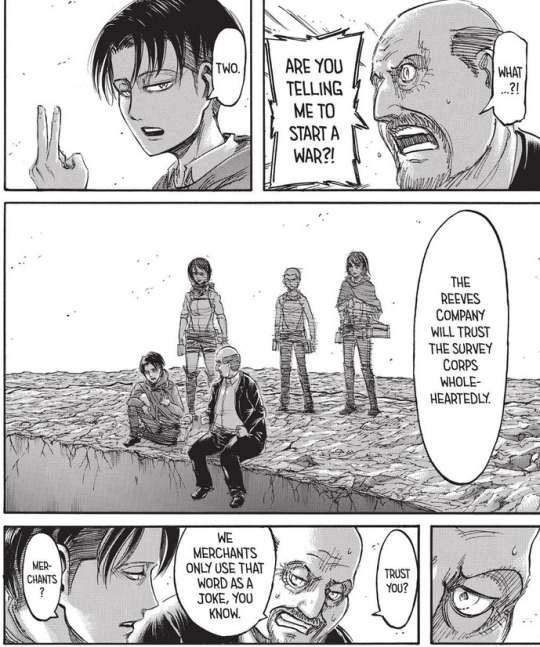
When Levi is laying out the conditions for the deal, it is evident that Dimo does not seem initially receptive. Levi uses the word "trust," which Dimo balks at.
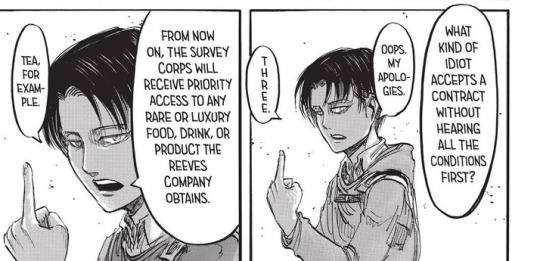
However, Levi's third condition, which is actually the most unimportant and superfluous one, results in Dimo accepting the deal. Why?
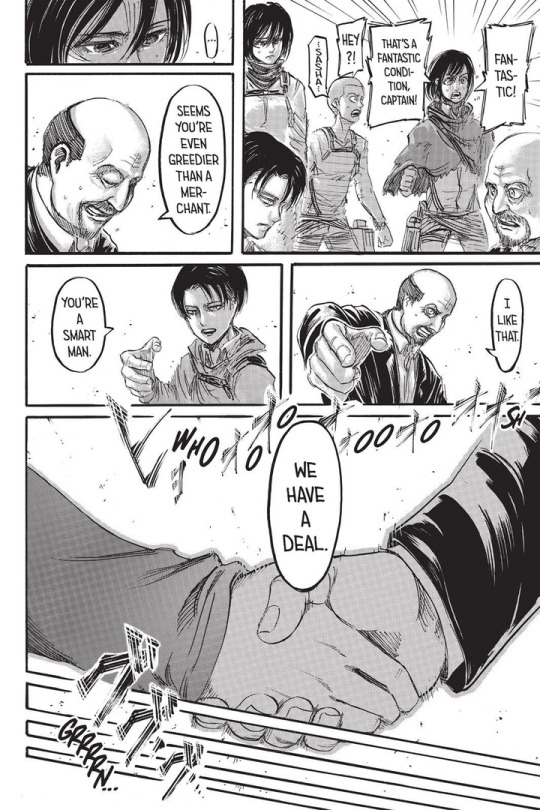
"Seems you're even greedier than a merchant." Dimo says this, as he is familiar at interacting with and respects other merchants. Levi added the third condition in, not simply because he wants tea and other luxurious goods, but because it brings himself down to Dimo's level. Without this condition, the deal may not have gone through. It is exactly this condition that results in Dimo "trusting" Levi as an equal.
This negotiation is also more evidence toward Levi's ability to think long-term. This deal between the Scouts and the Reeves Company benefits the Scouts for the remainder of the series.
III. Luring Kenny Into a Bar

Expanding on Levi's ability to make quick decisions while in the midst of battle, one of the best examples of this is Levi's first encounter with Kenny during the Uprising arc, where Levi lures Kenny into a bar and is able to defeat him as a result.
This goes beyond Ackerman prowess, as that is more related to superhuman strength and heightened combat reflexes. This is specifically a feat of intelligence; it's a sign of Levi's ingenuity—using aspects of the environment to his advantage. By luring Kenny into a bar, Levi is able to procure a weapon to even the playing field. Kenny himself is impressed and adds in that Levi was not taught these tactics by him. Some of the specific tactics of note:
III.a Use of Reflection
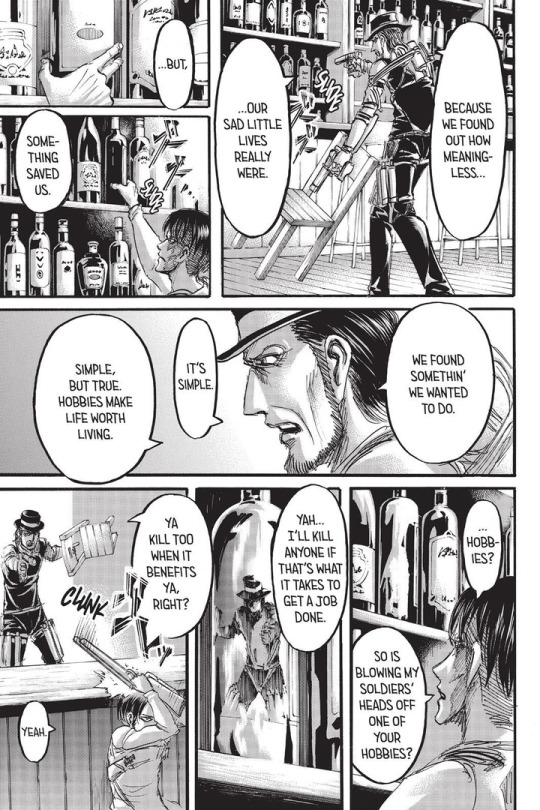
Levi is able to procure a shotgun while simultaneously taking cover from Kenny. He converses with Kenny to keep Kenny focused on him and not the bar's patrons, and even though Levi is facing away from Kenny, he uses the reflection off the alcohol's glass to properly aim the shotgun.
III.b Chair and Figuring Out the Firearms' Weakness
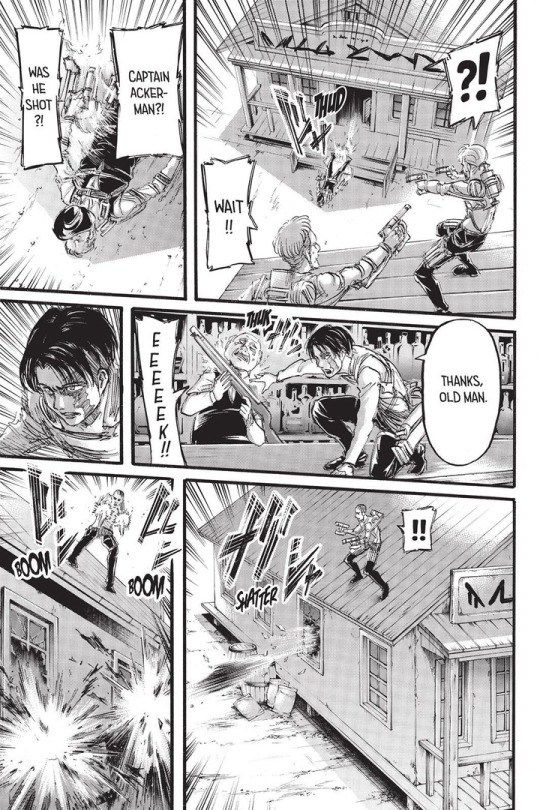
Levi knew he was going to be ambushed from up top as soon as he left the bar, so he threw a chair out the window to both distract and waste his opponents' shots. I'm fairly certain Levi was the first one to notice the main weakness of the anti-personnel vertical maneuvering equipment.
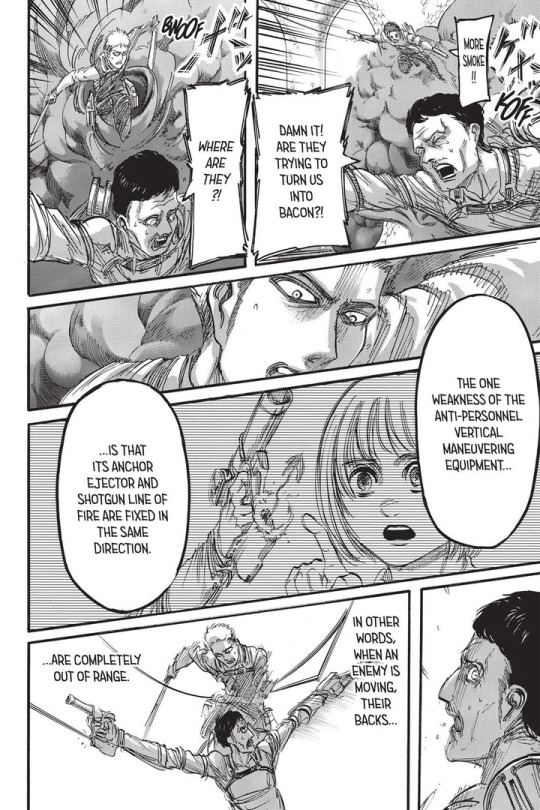
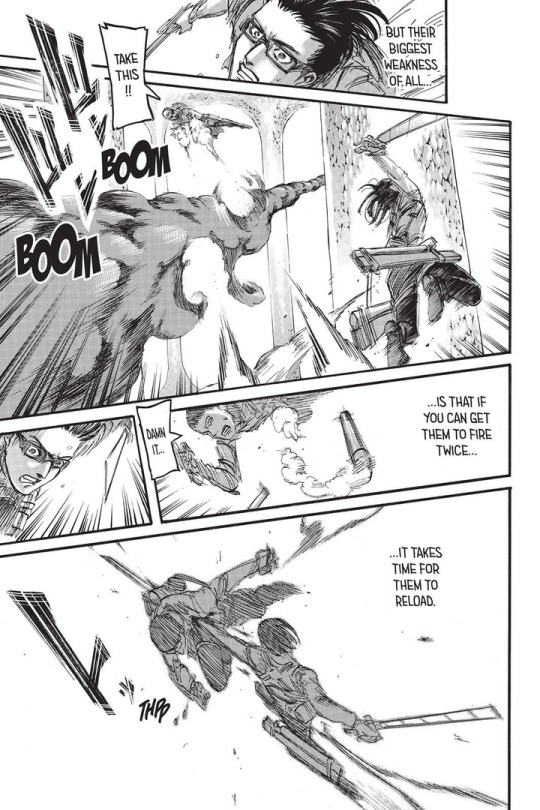
The main weakness, as Armin explains above in a later chapter, is that they need to reload after shooting twice. Levi first threw a chair, forcing one of his opponents to shoot twice, kills that opponent, and then uses that opponent's body as a shield against the other two guys' shots.
IV. Final Battle - Infers Immediately Armin is Alive
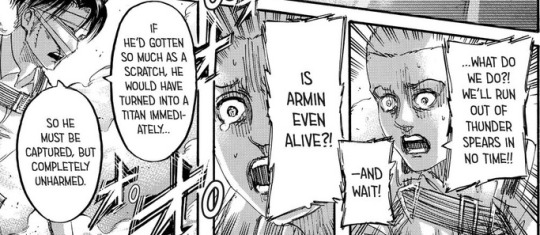
This one is pretty self-explanatory, but Levi is the first to infer that Armin has to be alive, given the way Titan powers work. As such, Levi is able to keep the others focused on the battle in front of them, knowing that Armin is alive and unharmed. This again speaks to Levi's quick thinking while in the midst of battle; it is often more difficult to make these sorts of judgments while in a fight-or-flight situation. Keep in mind as well that Levi is also grievously injured here, so it is even more impressive, how quickly he's able to make this inference.
V. Final Battle - Leadership and Planning
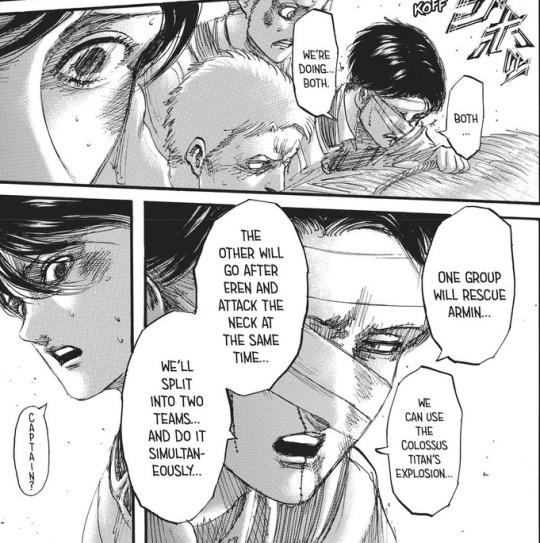
Full stop, the Alliance would not have succeeded without Levi, and part of that is because of Levi's ability to take charge and come up with a plan. This is the plan that they followed throughout the entire duration of the Battle of Heaven and Earth, and it is a plan Levi came up with, directly in response to an unexpected change in circumstances.
This again shows off Levi's skill in adjusting tactics to achieve a strategic objective. Even though the commanders are the ones often in charge of this, Levi is clearly very capable and adept at this himself. Right before this panel, everyone was arguing on how to proceed. Levi came up with the best overall plan, and in addition to that, formulated the two teams required to carry out that plan.
#attack on titan#shingeki no kyojin#levi ackerman#levi aot#aot#snk#attack on titan meta#aot meta#levi ackerman meta#c: levi ackerman#c: dimo reeves#aot.meta#meta.levi#my thoughts
325 notes
·
View notes
Note
so I saw some people claim the "only one man" is a mistranslation and that eruris spread it on purpose as misinformation because the original panel says something like "isn't there someone i can bring back" and I'm just wondering why only one man is suppose to be a mistranslation when it basically means the same, idk who translated it as "only one man", but imo it fits since levi is only thinking about erwin anyways right? but yeah I'd be curious if you know who originally translated it as only one man and why because we all know the official translations aren't always 100% accurate and not just in AOT
Tumblr now adds dates to the asks in my inbox so I can feel even more guilty about how long it takes me to answer them 😭 This one has been languishing since July and I’ve been meaning to answer it ever since. I’m so sorry it’s taken me so long Anon.
Anyway, I do actually remember seeing some drama about this on twitter back in the summer. The whole thing made me laugh because the screen cap that was being touted around as proof of Eruris duplicity is actually one of mine.

I capped this from one of the spoilers that came out in April 2016. I am not responsible for the translation though. I don’t know who actually translated this because I can't find the original and there were multiple accounts releasing spoilers and translations at the time plus at least two groups, if not more, doing full scanlations. It wasn’t uncommon for multiple and often quite different translations to appear, as more manga panels were leaked and the full raws finally became available. It’s also worth noting that some of the translations were from Chinese and some from the original Japanese. As you can imagine, the translation of certain panels often became very contentious, particularly when only fragments of the chapter were available. If you look back at the archive of the #snk 81 tag on my tumblr blog you can actually see the spoilers being released along with the various translations. I'm not quite sure when this particular version first appeared but I think @yusenki was one of the first to post a spoiler translation. You can see that they translated this panel as “Anybody…only one person”. There are various versions of this panel that I collected over the course of the week, including this one from a French translation of the chapter.

This isn’t the first time questions about the alleged “mistranslation” of this panel have come up. I spoke to @tsuki-no-ura about this and they pointed me to these two asks (X, X) they’ve already answered on the subject. Here’s the most relevant part.

So although this translation is worded slightly differently, Erwin is right there in every version and the meaning is still clear - Levi can only bring back one person with the serum, and it’s unambiguous who he is thinking of. @tsuki-no-ura has also made some other interesting points about how these panels have been translated, but I’ll leave them to add more if they have time.
Hope that answers your question Anon, and apologies once again for taking so long to reply.
44 notes
·
View notes
Note
how do you think levi would look before he went through everything he did
Hmm, depends on what you mean! Are you referring to before the thunder spear injury? I think that's the only lasting physical characteristic that was affected by something he had to go through.
I've seen many theories (maybe it was even confirmed, but I never looked into it oops) that he would have grown past what he was at in terms of height if he had been properly nourished instead of literally nearly starving to death during an important time for child physical development (I think like roughly the age he was when Kuchel passed, and also afterwards because you know that Kenny likely just fed him scraps—enough to keep him alive, and that's it).
#kat chats#or he could have looked exactly the same!#some people are just short (myself included) regardless of nourishment in childhood :)#levi#levi ackerman#levi meta
8 notes
·
View notes
Text
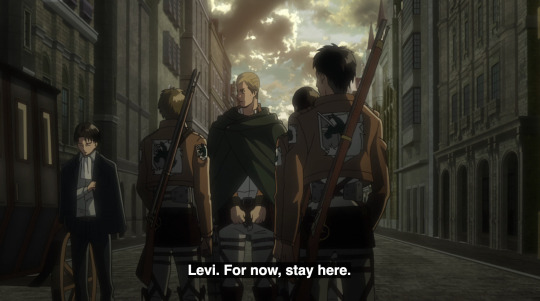
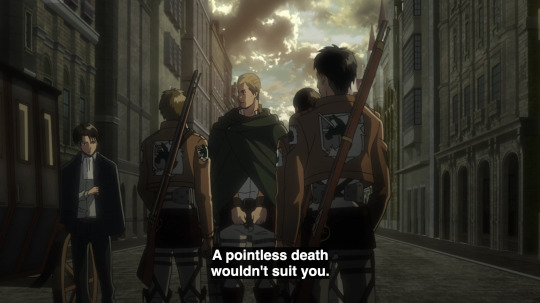
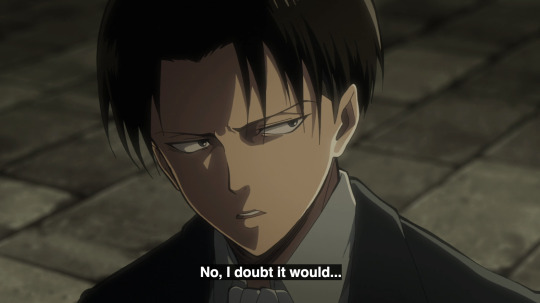
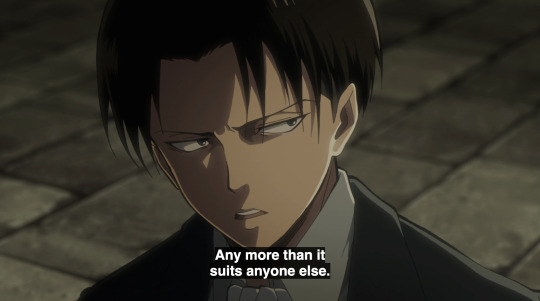
I saw @acmeangel's analysis post on this scene, which is fantastic and which everyone should read, and I was going to add my thoughts to their post, but then it got too long (as usual), and I didn't want to hijack their analysis, so I decided to just make my own, haha. This really is an important scene which essentially encapsulates the difference between Levi and Erwin and which I think ultimately showcases what makes Levi such a genuine hero.
One of the overarching messages of AoT is that we shouldn't give up our humanity in pursuit of an ideological goal. I've talked a lot about how Levi puts his trust in Erwin and admires him so much because he sees Erwin's ability to set aside his personal feelings for the greater good as a virtuous quality, one which Levi hopes to be able to one day emulate. Levi sees Erwin as superior to himself for this ability, because Levi, no matter how hard he tries, isn't ever able to do the same. He's never able to set emotion aside. He's never able to make decisions detached from emotion. He's never able to send soldiers to their deaths without it tearing him apart and creating in him a sense of conflict. He's never quite able to convince himself that the thing these soldiers are dying for, which they choose to die for, is actually worth it, which is also why he works so hard to bring their goal to fruition. He can't accept that those lives were given in vain, but the only way to ensure that they weren't is to make their dream comes true. Because to Levi, it's their lives that have value, not the cause itself.
One of Levi's most defining traits, one which makes him stand out from basically every other character in the story, is that he has no dream of his own. Rather, he carries the dreams of others, makes himself the custodian of those dreams, and dedicates himself to their realization.
When he says in this scene that a pointless death doesn't suit anyone, what he's saying is that the cause Erwin is sacrificing soldiers for has to prove itself worthy of their lives, that it has to amount to something equal in value to those lives. Because that's the thing, Levi values life above all else. He sees each, individual life as being as important as the whole of humanity, and I think that aspect of Levi's character is demonstrated fully during the RtS arc, when he makes the choice to end Erwin's suffering. People argue and claim that Levi made the wrong choice here because they don't understand the thematic significance of it, getting caught up in speculation about whether Erwin would have been able to prevent the war between Paradis and Marley, whether Erwin would have been able to stop the Rumbling, etc... By getting caught up in that, they completely miss the point of how the story wants the audience to understand the importance of not giving up our humanity for any cause. It's trying to show us, through Levi's choice, why we can't let any cause or ideological movement turn us cruel. Levi's refusal to be cruel, his refusal to throw away his humanity, is meant to be seen as a good thing, and ultimately, ironically, it's Levi's humanity and compassion that makes him a superior man to Erwin.
Erwin tries to assuage his own guilt by telling himself that the lives given were for a cause greater than any, individual life. The cause of humanity. This is a narrative he clings to until he's forced to admit to himself that what he really was after in sending all these soldiers to their deaths was his personal pursuit of knowledge, in another attempt to assuage his guilt for the death of his father. Erwin sacrifices his humanity for a goal which is self-serving, and as he's forced to contend with that reality, his guilt grows tenfold, fracturing his psyche and self-identity. But even if his every decision had been for the so-called greater good, even if he'd been 100% dedicated to his duty as Commander, he still would have been left with a sense of guilt and self-loathing for sacrificing lives to this nebulous cause, just like Hange ultimately was, because the whole point of the contrast between Levi and Erwin is to show that, in the end, Levi is the one whom the audience should strive to emulate, not Erwin.
This moment in the story is driving home the point of choosing compassion over ideology, or even duty. Levi's choice is imperative in demonstrating to us that if we sacrifice our own, personal humanity, if we give into becoming cruel and unfeeling, if we lose sight of the very thing that drove us to wanting the world to be a better place to begin with, that being our compassion and desire to end the suffering of others, no matter how justified the cause may seem, we're essentially sacrificing humanity itself. Because it's when you start becoming cruel, for any cause, that everything turns to shit, both for ourselves and the world around us. It's cruelty that leads into justification of more cruelty, which leads into justification of atrocities. Bringing Erwin back, forcing him back into that role which was tearing him apart, mentally, emotionally, and spiritually, would have been purely an act of cruelty. But Levi isn't a cruel man. He's exactly the opposite. He's a man defined by his compassion and kindness. And what is AoT advocating for if not greater compassion and kindness in the face of a cruel world? It's telling us that the kind of compassion that Levi showed to Erwin in his dying moments is how we should choose to fight against the world's injustices and cruelties.
Because all the bad things that happen in AoT, essentially, happen because of a willingness to sacrifice ones humanity for ideology or for personal, selfish desires, and because it's those of us who retain our humanity and compassion, despite the cruelty of the world, and despite any supposed duty to any professed cause, that end up being able to live, as Levi says, with no regrets. This idea of sacrificing what we know is right for some abstract, nebulous goal of a better tomorrow is what leads to the destruction and corruption of our inner selves, and that, ironically, makes a better tomorrow impossible. If we become corrupted, if we allow ourselves to be lost to this idea of the greater good, in the end, it will only continue on the cycle of destruction.
Levi never sacrifices what he believes is right, never acts in any way which goes against his conscience. He never betrays his humanity. He maintains his compassion from beginning to end, and he never wavers in what he's fighting for, which, again, is every, individual life. That's what makes Levi a hero. His inability and refusal to set his personal feelings aside is, in the end, meant to be seen as the correct course. Because Levi's personal feelings have nothing to do with a dream or a goal. They have nothing to do with an ideology or movement. They aren't rooted in self-gain or greed. His sense of duty isn't to a cause, not to a country or an empire, or a sense of retribution or revenge. His duty, his obligation, is to doing what he feels, in his heart, is the right thing, what his personal feelings tell him is the right thing, no matter the situation or circumstances, no matter, even, if it turns out to have been the right choice or not. And that ties back into Levi's extraordinary compassion and empathy. It's his compassion and empathy which dictate his personal feelings of right and wrong, and his dedication to not betraying that sense is what ultimately dictates all his choices.
Levi thought of himself as a lesser man than Erwin because of this. Because of the way he wasn't able to set his personal feelings aside in the choices he made. It's why he chose to follow Erwin, because he thought it made Erwin superior to himself. But in truth, it's that quality of Levi's, that deep seated empathy, that makes him the better man. He can't detach himself from his compassion, he can't make choices without considering the consequences and impact of those choices on others, or even without making that consideration the principle factor in his choices, and that's a good thing. That's humanity. That's what makes the world a better place. By caring about how our choices affect others. That's not meant to be seen as a bad thing. Levi's kindness and empathy isn't meant to be seen as wrong.
Levi never betrays who he is, and he never betrays what he believes in, even as everyone around him does, at one point or another. That's true strength, that's true courage, that's true heroism. Someone who cares so much about people that he can't make a choice without factoring in the thoughts, feelings and desires of those people. Levi is meant to be the audience's role model, the character we're meant to want to be more like. Not Erwin. Because no matter how noble the goal we pursue, if we stop caring about each other in that pursuit, it all becomes for naught.
119 notes
·
View notes
Text

Panels like these hit different when you know Levi and his backstory. I am not sure if Levi ever told anyone about his mother before Falco and Gabi. He sees a starving woman with a child and gets reminded of his mother. Kuchel, Levi thinks about her often, she is the person he loved the most. I think that he took after her in more aspects than just looks, Levi is a giver, he is extremely selfless, he fights for people and doesn't ask for anything in return. While it was somewhat selfish of Kuchel not to abort Levi giving the circumstances she was in, she took care of him and gave him everything she could. Who knows how many times she starved herself just for Levi to have something to eat, the woman with that baby reminded Levi of what his mother went through just to keep him alive. It also shows the empathy Levi feels for other people. Levi's biggest strength is his heart.
#aot#aot levi ackerman#attack on titan#levi#levi ackerman#shingeki no kyojin#aot levi#levi aot#snk#aot manga#aot meta#snk manga#attack on titan manga
514 notes
·
View notes
Note
Following your answer on homosexuality in AoT, how would sexism in AoT be handled on both sides of the spectrum, female and male, on Paradis and in Marley?
Hi, dear! How are you?
Ah, that's such a good question. You know, I did a post about it a LONG time ago, but it’s a topic I touch on a lot in my fics and here from time to time.
I'll set the context of my reply with three ideas. First, sexism or misogyny ALWAYS exists. It exists in our society like oxygen does. In many countries, it’s not the same sexism as in the 1800s, but it still exists. Second, the Scouts PER SE are the "wokes" of their time; they don't have the same views, lives, and beliefs as regular people inside the walls. So I always think that the Scouts are a bit of an "exception" from the rest of Paradis.
Third, and I state this because my blog is Levi-centered, Levi is ALREADY a person, and in particular, a man, with a very different and unique upbringing. I DO believe that Levi has a more "modern" or "woke" view on "women," "women's rights," and "house chores" than the rest of the men. I'll simply say this: a man who saw his mother being treated like garbage because she worked as a prostitute, a man who had to raise himself, and a man who RAISED a girl out of pure heart. I hardly think he judges women on how they dress, who they sleep with, or thinks that "a man shouldn't cook or clean/take care of the kids." So Levi is kind of an exception for me. This doesn't mean he doesn't have internalized misogyny or "micro-sexism" (which I'll talk about later).
Overall, despite both societies allowing "women" in the military, I don't think their views on women or men's roles are much different. I believe there are a few clear examples of this in the manga. If my memory serves me correctly (and take this with a grain of salt because I know that Isayama gave multiple interviews, and a lot of them were edited), he said on one occasion that the Scouts were different because usually, everybody helps with all the chores, like cooking, cleaning, etc., because they work more united and as a family than the rest of the military divisions. Second, he said in one interview right after the manga ended that when he draws "military boards or higher ranks," he always keeps in mind not to add women because they aren't allowed.
Other scenes that quickly come to mind that make me think that Paradis (and I'll speak mostly of Paradis because we don't see much of Marley as a society) is a very sexist society with traditional views:
Most of the time, when we are shown military members from the Garrison OR the MPs, they are mostly men.
Which women are shown that are "recalled" from the Garrison? Riko and Anka… What role does Anka have? Being a secretary for Pixis, more or less, a very stereotypical role for a woman.
A very memorable woman from the MPs is Hitch, and there's a scene where it's clearly said that "there's only one way a woman like Hitch can get into the MPs," basically stating that she made sexual favors to get into that position.
Not a single scene from the military board or higher-up positions shows a single woman.
All the mothers of the characters shown in the story are "housewives" or "stay-at-home moms," which is absolutely fine if a woman decides to dedicate her time to her family as long as it’s a decision she made and not because she didn’t have "other options." Even Eren's mother, Carla, is shown to work as a waitress before she became a mother and a housewife.
All this makes me conclude that probably women inside the military never reach far, either because they aren't allowed (men are preferred over them, offered better positions, promoted first) or because once they get married, they are expected to become stay-at-home wives. I can clearly imagine people thinking that if you get promoted as a woman, it's because you're sleeping with your boss, or if you haven't gotten married and had kids at a certain age, "you're wasting your time" or "a woman's role is to be a mom; they only feel fulfilled like that."
This creates a power dynamic: women are expected to be wives; therefore, men are expected to be the main providers. And this is something I can see men, particularly Levi, being affected by. In my fic, I wrote once that Levi gets very offended when the reader invites or pays for him because she comes from a wealthy family. For Levi, as internalized misogyny, HIS role as a man is to provide. What kind of man is he if he's not paying? Especially for the Scouts' men, it's said that the Scouts have the lowest salaries in the military. If they can't provide, their chances of getting married are probably low. Even today, a lot of men get sensitive or offended if their wives make more money than them. Or men get irrationally jealous and butthurt if their women are more successful than them.
Another way men might get the sour end is in terms of emotional availability. While women's harsh reality is known, men's struggles often aren't. For example (one from Marley), Reiner's mother suffers a lot of social prejudice because she had a kid out of wedlock, and her only "salvation" is that Reiner becomes a warrior. Even today, men struggle with being emotionally available and having more feelings than just "lust and anger." I can totally see men all over the AoT world having to be these "very tough" guys who are only allowed to be "human" when they are alone with "their girl/wife." This happened a lot after WWI; men were sent back home with horrible memories of war and society expected them to just "toughen up and be men." Go, work, and provide for your family; and if you're suffering from everything you lived, then learn to be a man.
It's like I can literally imagine Erwin perhaps complaining that he's having a hard time, and Zackly or any other dude would be like, "You know what you need? A wife; she will take care of the rest."
"I don't have time to dedicate."
"Doesn't matter, a good wife always understands."
"… my salary isn't that good."
"Oh well, you know it's never too late for you to change divisions and settle down." pat on the back lmao end of the advice, and Erwin has the same emotional stress as before.
Overall, I think their views are probably as traditional as they were only a couple of years ago. This is completely ignorable for the sake of fanfiction and having fun; not every piece you write has to send a message or be political. But if you ask me how I think canon AoT characters are, I believe a good part of them, if not most, would be very traditional.
Hope this helps! I tried to cover everything I could remember while being as concise as possible. Thank you so much for your question!
Lots of love!
#aot meta#aot#attack on titan#shingeki no kyojin#levi ackerman#levi#snk#captain levi#levi aot#snk levi#attack on titans#lucy answers
201 notes
·
View notes
Text





1. The mother and child reminded him of his time with his own mother. This time with the difference that he had the power to protect that starved mother & child from having the same fate as Kuchel.
2. He knew what would've happened to Ramzi hadn't he stopped the Marleyans because he had already experienced the cruelty of those in power just because he wanted to take back what was already his.
Now we're even more certain of Levi Ackerman's caring personality and compassion ❤️
#levi ackerman#levi bad boy#snk#shingeki no kyojin#attack on titan#aot#snk spoilers#snk levi#snk thoughts#snk meta
182 notes
·
View notes
Text
I made basically this exact post a while ago when this season of Invincible started, but I really appreciate that in this episode they went out of their way to demonstrate to the audience via montage that Angstrom Levy is after Mark's ass specifically because he was driven insane by the botched transfer process giving him the memories of hundreds of alternate versions of himself whose friends and family were personally murdered by Invincible. This was also ultimately what was implied to have happened in the comic but it wasn't conveyed as effectively, so it ended up reading a lot like he was mad specifically about Mark fucking up the transference process, maybe mixed with some broad form of degenerative insanity resulting from his mutation. This version is a lot more pointed about it, which makes the tragedy- and particularly the tragedy of Mark breaking down after his apparent first kill- really pop.
197 notes
·
View notes
Text
Should Levi and Hange have fought after the events of Shiganshina regarding their disagreement?
I've seen people say that Hange and Levi should have had a certain altercation regarding Levi's decision to pick Armin instead of Erwin, or that their friendship should’ve been “fractured” by Levi’s decision (see post below). The person then was going in further detail in the threads as to why that should’ve been the case, but their threads were quite long. The general idea of their thread remains that Levi and Hange’s bond should’ve been weakened by his decision.

Here is another take like that as well (I won’t even go into the details of how this person even misinterprets Levi’s decision by saying he was selfish for letting Erwin go, but they do that too):

I’ve also seen people discuss how the moment between Levi and Hange in the woods from chapter 126 should’ve actually been about them discussing Levi’s decision, as seen by this post below (the chapter in this context refers to chapter 126 as it was posted right after the release of the chapter in the manga).

And to all that, I'd like to counter-argument, showing why such “fight” scene between them is unnecessary in the manga and why Isayama hasn't included anything alluding to a form of altercation between Levi and Hange, let alone in a scene where the physical closeness between the two is at its highest, and the reason for that is quite simple: their disagreement was resolved the same day that it happened in Shiganshina, because both Levi and Hange are mature people who can still respect and support each other regardless of their disagreements. I think people claiming that Levi and Hange's relationship should've been weakened after Erwin's death due to Hange feeling some sort of resentment towards Levi don't understand the nature of Levi and Hange's bond in the first place, or they would've rather preferred a version of their relationship that fights and bickers over pointless things, which plays in the idea that some people really don't see Levi and Hange as close enough if they believe such ideas about their bond.
I've even seen people state that the reason they don't like Levi and Hange's relationship is because they "don't fight enough", so this is why they would've liked to see a scene where they fight. Disliking Levi and Hange's relationship is totally valid of course, but to dislike it because they didn’t “quarrel” enough shows these people misunderstand Levi and Hange’s relationship. This is not a post trying to tell people they should like Levi and Hange’s bond after this, but I do want to explain why such fictional quarrel didn’t happen in the manga. This isn’t something Isayama forgot to add or overlooked. Such quarrel simply isn’t necessary to be portrayed, and it is clearly stated in the manga.
In chapter 85, The Basement, we see Hange clearly express their opinion about Levi's decision, which is that the serum should've been given to Erwin instead of Armin. They don't hesitate to disagree with Levi, because despite being close, people can still have disagreements over things and not destroy relationships over them, which is Levi and Hange's case. However, Hange adds that Erwin entrusted Levi with the decision to give the serum to someone Levi thinks is the best suited to receive it, and since Levi chose Armin, Hange respects his decision. Here is the manga panel in question to better put everything into perspective:

Hange's quote at the end of this exchange, "There's nothing more to say", perfectly encapsulates the end of their disagreement. Hange won't go over Levi's decision or will question him on it, because they respect it. This scene actually shows how mature both of them are, and despite their differences in opinions, can still continue to mutually support and respect each other. Why should Hange shout at Levi for an opinion they don't share? Their relationship is deeper and closer than getting angry over pointless disagreements. The deed is done, and Levi made his decision, which Hange respects despite not agreeing with him. Seeing Hange get mad at Levi for no choosing Erwin would be completely out of character for Hange, because despite having bouts of anger sometimes, they would never get angry at Levi for making such a difficult decision. Therefore, claims they should've reopened the subject in the forest in chapter 126 when they're both at their most vulnerable, Levi physically and Hange psychologically, don't really make sense as that subject closed that day in Shiganshina at the top of the wall. As Hange very well said it, there was nothing more to say.
This actually reminds me of the interesting parallel chapter 132, The Wings of Freedom, makes between Hange and Floch as the two characters dying in that chapter. Both of them openly disagreed with Levi's decision to choose Armin instead of Erwin, but where Floch could never accept it, hence why he decided to follow Eren as this "new devil", Hange on the other hand not only disagrees with him when they say that they can't give up as they must stop Eren's genocide, as seen by the panel below, but they approve of Levi's decision by appointing Armin as the next commander after them, which is the reason in my opinion as of why Armin was chosen as commander and not Jean or Levi, as some people felt it would've been better to see either Jean or Levi as commanders rather than Armin.

This is the panel in which Hange makes Armin the next commander, effectively upholding Levi's decision. This scene is the culmination of Hange's respect for his decision regardless of their own opinions on the matter.

Hange didn't make Armin commander simply to validate Levi's decision, as they tell Armin their reasons on why they believe Armin is suited to be the commander after them, but I think we can also read Hange's appointment of Armin as them accepting Levi's decision compared to Floch.
So, if we come back to our original question, should Levi and Hange have fought after the events that happened in Shiganshina, the answer is no, and it makes sense narratively-speaking in the story for both Levi and Hange.
#attack on titan#levi ackerman#hange zoe#erwin smith#armin arlert#floch forster#aot meta#snk meta#aot#snk#levihan
61 notes
·
View notes